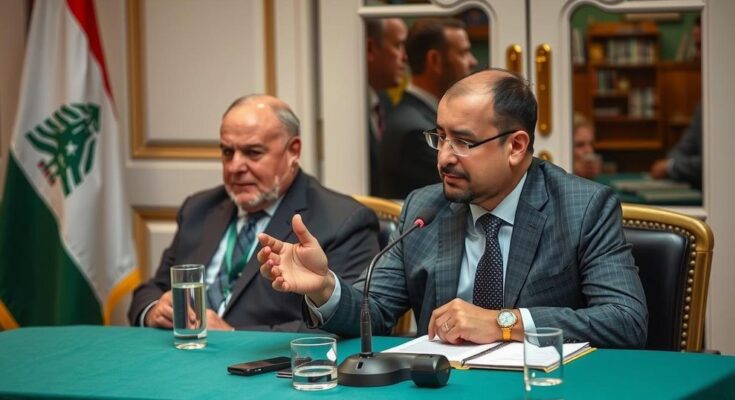Syria’s new leader, Ahmad Sharaa, calls for a fresh start in relations with Lebanon, promoting long-term strategic ties and addressing past grievances, particularly regarding border security and missing individuals. Sharaa conveys that mutual interests should guide future cooperation, signaling a departure from the Assad regime’s previous dominance over Lebanese affairs.
In a significant development, Ahmad Sharaa, Syria’s newly appointed leader, has extended a hand to Lebanon, urging the nation to move past the historically tumultuous relations governed by the Assad regime. During a news conference with Lebanese caretaker Prime Minister Najib Mikati, Sharaa promised a commitment to fostering long-term strategic ties based on mutual interests and respect for each country’s sovereignty. He acknowledged the past strains caused by the Assad family’s rule, particularly under Hafez Assad and Bashar Assad, who was recently deposed by Islamist militants.
Sharaa emphasized the importance of a collaborative effort to address lingering issues, including border control to prevent illegal crossings leveraged for smuggling drugs and arms. His administration plans to refrain from favoring any Lebanese political faction, contrasting sharply with Syria’s former dominant influence over Lebanon’s internal affairs. Mikati echoed Sharaa’s sentiments, highlighting the urgent need to entirely regulate the shared borders while also pledging to confront security matters comprehensively between the two nations.
Negotiations also covered unresolved humanitarian concerns, notably the status of Lebanese individuals who disappeared during the Syrian military’s extensive occupation from 1976 to 2005. Sharaa’s government has committed to investigating these cases, aiming to provide closure for the families involved. Furthermore, the topic of American journalist Austin Tice, who was allegedly abducted by Syrian authorities, was also raised, with assurances that his case is receiving serious attention from the new leadership.
The article addresses a crucial moment in Syrian-Lebanese relations following the recent political transition in Syria, particularly after the ousting of Bashar Assad. Historically, Syria has exerted significant influence over Lebanon, involving military presence and political manipulation that deeply affected Lebanon’s governance and stability. The past two decades were marked by Syrian control, a situation exacerbated by the Lebanese Civil War and subsequent events, particularly the assassination of prominent figures like Rafik Hariri. Following the start of the Syrian civil war in 2011, Syrian influence began to diminish, creating an opening for potential reconciliation and strategic partnership between the two nations under Sharaa’s leadership.
In conclusion, Ahmad Sharaa’s pledges signify a potential turning point in Syrian-Lebanese relations, with an emphasis on mutual respect and cooperation. By prioritizing border security and addressing historical grievances, Sharaa and Mikati aim to build a collaborative future, distancing themselves from the negative legacies of the past. This new strategic partnership could foster stability for both nations, especially amid ongoing regional tensions.
Original Source: www.upi.com




